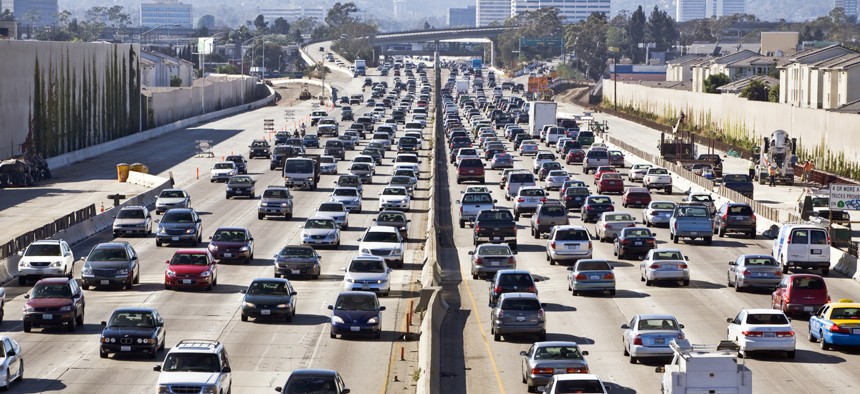17 States Move to Block EPA Weakening of Fuel-Economy Standards

The 405 Freeway in Los Angeles Shutterstock

Connecting state and local government leaders
"States joining California in this suit are part of a broader movement of states, cities, and businesses that are driving down emissions without any help from Washington.”
California’s state government sued the Environmental Protection Agency on Tuesday ahead of the agency’s expected rulemaking designed to weaken U.S. vehicle emission standards.
Joined by 16 other states and the District of Columbia, California filed a lawsuit in federal court arguing the EPA under Administrator Scott Pruitt acted arbitrarily and capriciously, ignored its own regulations and violated the Clean Air Act.
On April 13, the EPA moved to scrap clean car standards for model years 2022-2025 calling them unattainable—standards created in 2010 by the agency, the National Highway Traffic Safety Administration and the California Air Resources Board to regulate emissions. In return, the federal government under the Obama administration gave the auto industry a multi-billion-dollar bailout amid the Great Recession.
“The standards we are fighting to protect were adopted in 2012 and don’t take effect until 2022. They were a lifeline thrown to an industry that was in trouble and desperate for stability. They were based on the best judgment of engineers about what technology could achieve. And in fact they are being achieved today, years ahead of the deadlines, because of the good work of the auto industry,” CARB Chair Mary Nichols said in a statement. “But now Administrator Pruitt, based on no new information or facts, wants to roll back all that progress in the name of deregulation. The Final Determination is just the first step but it is intended to provide the legal basis for a decision that has already been made: to halt the progress that regulators and industry have made toward a new generation of vehicles. It does not withstand scrutiny and it will not stand.”
California holds a federal waiver allowing the state to set stricter air pollution rules for cars that would require the average fuel economy for new passenger vehicles to double by 2025 to 54 miles per gallon. Other states piggybacked onto the waiver, with the coalition representing 43 percent of the new car sales market nationally—too large a share for the auto industry to bother building to the lower national standards as well.
Pruitt, who has worked to delegitimize the science behind climate change and come under fire for his close ties to the oil and gas industry, has new regulations in mind. Working with the Transportation Department, he plans to offer eight options including the preferred freezing of fuel-economy standards at 2020 levels for cars and light trucks—about 40 miles per gallon or less, The New York Times reported.
“The evidence is irrefutable: today’s clean car standards are achievable, science-based and a boon for hardworking American families,” said California Attorney General Xavier Becerra in the announcement. "But the EPA and Administrator Scott Pruitt refuse to do their job and enforce these standards.”
California’s coalition estimates their standards will reduce carbon pollution equivalent to 134 coal power plants burning for a year and save drivers $1,650 a vehicle.
The other states in the coalition are Connecticut, Delaware, Illinois, Iowa, Maine, Maryland, Massachusetts, Minnesota, New Jersey, New York, Oregon, Pennsylvania, Rhode Island, Vermont, Virginia, and Washington filing through various agencies.
"States joining California in this suit are part of a broader movement of states, cities, and businesses that are driving down emissions without any help from Washington,” former New York City Mayor Michael Bloomberg, who is a United Nations special envoy for cities and climate change, said in a statement. "The EPA would have better luck trying to require horse-and-buggies than they would trying to stop the push for cleaner vehicles."
Dave Nyczepir is a News Editor at Government Executive’s Route Fifty and is based in Washington, D.C.

NEXT STORY: 3 ways agile can improve communications during contract transitions





